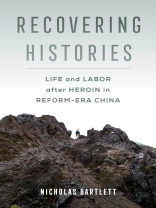Heroin first reached Gejiu, a Chinese city in southern Yunnan known as Tin Capital, in the 1980s. Widespread use of the drug, which for a short period became “easier to buy than vegetables, ” coincided with radical changes in the local economy caused by the marketization of the mining industry. More than two decades later, both the heroin epidemic and the mining boom are often discussed as recent history. Middle-aged long-term heroin users, however, complain that they feel stuck in an earlier moment of the country’s rapid reforms, navigating a world that no longer resembles either the tightly knit Maoist work units of their childhood or the disorienting but opportunity-filled chaos of their early careers. Overcoming addiction in Gejiu has become inseparable from broader attempts to reimagine laboring lives in a rapidly shifting social world. Drawing on more than eighteen months of fieldwork, Nicholas Bartlett explores how individuals’ varying experiences of recovery highlight shared challenges of inhabiting China’s contested present.
表中的内容
List of Illustrations
Acknowledgments
Introduction: Toward a Phenomenology of Recovery
1. Mayhem on the Mountains: The Rush of Heroin’s Arrival
2. Recovery as Adaptation: Catching Up to the Private Sector
3. Absence of a Future: Narrative, Obsolescence, and Community
4. Idling in Mao’s Shadow: The Therapeutic Value of Socialist Labor
5. A Wedding and Its Afterlife: Relationships, Recovery
6. ‘From the Community’: Civil Society Ambitions and the Limits of Phenomenology
Epilogue
Appendix: Events Impacting the Heroin Generation
Notes
References
Index
关于作者
Nicholas Bartlett is Assistant Professor of Contemporary Chinese Culture and Society at Barnard College, Columbia University.












